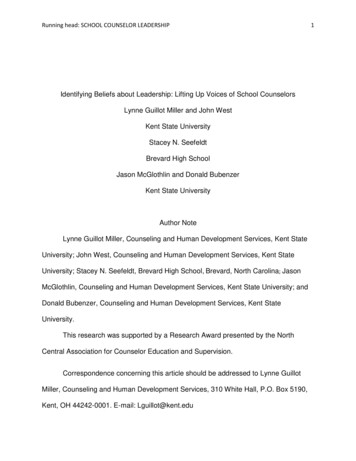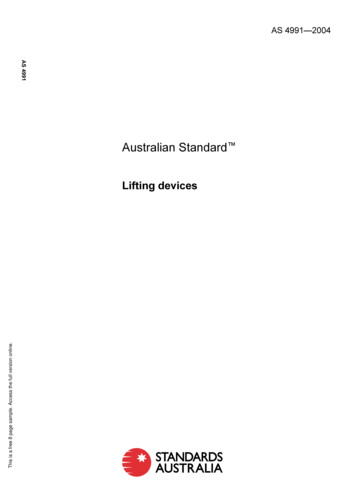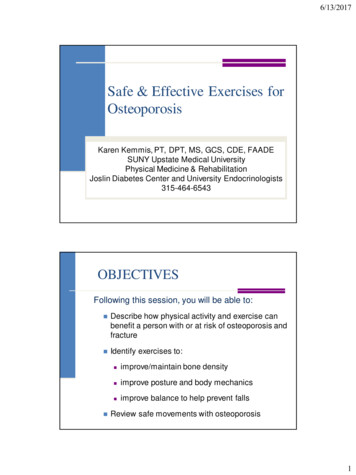
Transcription
Running head: SCHOOL COUNSELOR LEADERSHIPIdentifying Beliefs about Leadership: Lifting Up Voices of School CounselorsLynne Guillot Miller and John WestKent State UniversityStacey N. SeefeldtBrevard High SchoolJason McGlothlin and Donald BubenzerKent State UniversityAuthor NoteLynne Guillot Miller, Counseling and Human Development Services, Kent StateUniversity; John West, Counseling and Human Development Services, Kent StateUniversity; Stacey N. Seefeldt, Brevard High School, Brevard, North Carolina; JasonMcGlothlin, Counseling and Human Development Services, Kent State University; andDonald Bubenzer, Counseling and Human Development Services, Kent StateUniversity.This research was supported by a Research Award presented by the NorthCentral Association for Counselor Education and Supervision.Correspondence concerning this article should be addressed to Lynne GuillotMiller, Counseling and Human Development Services, 310 White Hall, P.O. Box 5190,Kent, OH 44242-0001. E-mail: Lguillot@kent.edu1
SCHOOL COUNSELOR LEADERSHIP2AbstractIn this study an effort was made to identify the views of six school counselors relative totheir leadership role in the school. The study used qualitative methodology and threethemes pertaining to school counselor leadership were identified, i.e., school counselorsbelieving in a shared sense of leadership, believing in the importance of beingtrustworthy, and believing in persistence or endurance. Further descriptions of thesethemes are presented in the article.Keywords: school counselor, leadership, qualitative, school collaboration
SCHOOL COUNSELOR LEADERSHIP3Identifying Beliefs about Leadership: Lifting Up Voices of School CounselorsThe authors of the American School Counselor Association’s (ASCA) NationalModel: A Framework for School Counseling Programs (ASCA, 2005) encouragedschool counselors to be leaders in their schools. School Counselor PerformanceStandard 13.3 included in the ASCA national model states, “The professional schoolcounselor takes a leadership role within the counseling department, the school settingand the community” (p. 65). ASCA has also included leadership as part of its currentethical standards. The standard suggests that school counselors provide leadership thataids in removing barriers that prevent students from achieving their educational goals(ASCA, 2010). Additionally, Devoss and Andrews (2006) found that activities associatedwith leading appeared throughout the 213 Performance Standards contained in theASCA national model, and thus it was thought that school counselors would need tohave leadership skills in order to meet the standards. These leadership skills included“planning, organizing, consultation, program management, establishing and conveningan advisory council, collecting and analyzing data to guide program direction andemphasis, evaluating results, conducting an annual program audit, and infusing themesof student advocacy, education reform, equity, community, teaming, and systemschange into the school environment” (p. 33). Bemak (2000) wrote of school counselorsundertaking leadership through collaborative endeavors within the school, agencies inthe community, and families. Bemak (2000) mentioned that, “It is critical that schoolcounselors work closely with other professionals in the school, especially in the capacityof becoming leaders in school reform, meeting educational goals, and fostering safety”(p. 327).
SCHOOL COUNSELOR LEADERSHIP4For the broader counseling profession, of which school counseling is a part,leadership has been described by professional organizations and researchers. ChiSigma Iota, the international counseling profession’s academic and professional honorsociety wrote of 10 principles and practices for leadership (Chi Sigma Iota Academy ofLeaders for Excellence, 1999). Included in 10 principles of Chi Sigma Iota weredescriptions of leaders as those in the profession who viewed and practiced leadershipthat was altruistic, collaborative, fiscally responsible, reflective, and respectful oforganizational history and membership. Additionally, West, Osborn, and Bubenzer(2003) wrote of appreciating one’s context, establishing a vision, and utilizing action inleadership.Others like Bennis and Nanus (2003) have investigated perspectives onleadership from corporate leaders and from leaders in the public sector. Theperspectives of Bennis and Nanus may have implications for school counselors as theytake on leadership activities because they commented on the significance of a vision forthe organization, the importance of conveying the vision to others, the relevance of trustin leadership, and the place for positive self-regard in leadership. Likewise, Kouzes andPosner (2002) commented on practices of exemplary leaders, and they mentionedmodeling behavior expected of others, inspiring others with a common vision,challenging the process of the organization, helping others to contribute to desiredoutcomes, and offering appreciation for contributions from others. Indeed, skills ofleadership and specifically skills used by school counselors in leadership efforts areworthy of study. In the current investigation an attempt was made to lift up the voices ofsix school counselors regarding their views on leadership. This was done in order to
SCHOOL COUNSELOR LEADERSHIP5study beliefs pertaining to leadership from individuals actually serving as full-time schoolcounselors. In order to undertake this investigation, a qualitative research design wasused.Purpose of the StudyThe guiding question of our research was: in what ways do participantsexperience school counseling leadership? Through our methodology we attempted togain an understanding related to the common experiences of the interviewed schoolcounselors related to their leadership including their perceptions of school counselingleadership and leadership activities.MethodologyA qualitative methodology was used to collect information related to participants’conceptualizations of school counseling leadership. Patton (2002) suggested thatqualitative approaches allow researchers to study topics in-depth, thus increasingunderstanding of the topic under consideration. The researchers used in–depthphenomenological interviews to gather information related to the participants’experiences and conceptualizations regarding leadership. Creswell (2007) suggests thatphenomenological approaches are most appropriate when the researcher is attemptingto understand the essence of shared experiences of a phenomenon. In this study ourparticipants were identified as leaders by their supervisees and it was hoped that theycould provide researchers with a deeper understanding of their experiences ofleadership as a school counselor. Marshall and Rossman (2011) suggested that thepurpose of phenomenological interviewing is to, “describe the meaning of a concept or
SCHOOL COUNSELOR LEADERSHIP6phenomenon that several individuals share” (p. 148). For this research that conceptwould be their experiences and beliefs about school counseling leadership.Analysis of the interview transcripts was completed in an attempt to understandthe school counseling leadership experienced by participants. A content analysis wasperformed to inductively analyze the data gathered from the participants (Berg, 1998).These experiences were to involve how participants conceptualize school counselingleadership and how they participate in leadership activities.Participant SelectionThe Leadership Rating Scale, an instrument developed by the authors for thepurpose of this investigation, was utilized to identify participants for the study. The scalewas created because the researchers were unable to locate an instrument that directlyrelated to school counselor leadership that was being proposed in the counselingprofession [e.g., in the ASCA National Model (2005); Chi Sigma Iota Academy ofLeaders for Excellence (1999)]. Students enrolled in a master’s degree schoolcounseling internship course at a large Midwestern university were asked to rate theiron-site supervisors using the scale. The students completing the rating scale hadcompleted the majority of their course work and at least two courses related to schoolcounseling, both of which included the topic of school counseling leadership and hadapproximately spent between 10 and 24 weeks in their internship site. Thus, theresearchers believed the students would have been able to identify effective schoolcounseling leadership in their on-site supervisors. It was believed that the time studentsspent in close working relationships with their on-site supervisors would provide themwith enough time to adequately observe a multitude of leadership activities, if leadership
SCHOOL COUNSELOR LEADERSHIP7was performed, and thus be able to capably complete the survey. Potential participantsincluded 16 licensed school counselors with a minimum of two years of post-master’sexperience as on-site supervisors for students.The Leadership Rating Scale included 17 items and was a Likert-type scale withone (1) representing strongly disagree and six (6) representing strongly agree.Therefore, scores could range from 17 points to 102 points. The scale items for theLeadership Rating Scale included general questions involving leadership, for example,“My on-site supervisor acts as a leader in his/her school building,” as well as itemsderived from the ASCA National Model (ASCA, 2005), for example, “My on-sitesupervisor advocates for students” and “My on-site supervisor has an advisory councilor those that he/she collaborates with in implementing the school counseling program”.Additionally items were derived from the professional literature, for example, “My on-sitesupervisor seeks feedback from others relative to his/her performance through formalmethods” (Chi Sigma Iota Academy of Leaders for Excellence, 1999; Drucker, 1999;Kouzes & Posner, 2002; Senge, 1999) and “My on-site supervisor takes an active partin professional organizations related to counseling or education” (Chi Sigma IotaAcademy of Leaders for Excellence, 1999; Osborn, West, Bubenzer, Duba, & Olson,2003).The scores for each on-site supervisor were added to provide a cumulative scoreof which the top six scorers were identified and invited to participate in the second partof the study, the interview portion. The scores for all 16 on-site supervisors ranged from100 to 48 points with the top six on-site supervisors’ scores ranging from 100 to 90points. The top six scorers were included because six participants would allow for
SCHOOL COUNSELOR LEADERSHIP8manageability of the data collection and analysis and a score of 90 appeared a naturalcutoff. The six participants did indeed allow the researchers to reach a saturation pointin the data in which no new perspectives were gained (Strauss & Corbin, 1990).However, the researchers were willing to invite more participants if saturation was notmet after interviewing the six participants.ParticipantsParticipants in the study were six school counselors currently working at middleand secondary schools in a state in the Midwest. To protect the school counselors’identities, pseudonyms are used. As mentioned above participants were recognized asleaders by the students who were receiving supervision from them as a requirement ofa school counseling internship course by being the top six on-site supervisors rated bytheir interns on the Leadership Rating Scale. Three participants, Peter, Lacy, and Kelly,worked in middle schools with the remaining three participants working at the secondarylevel. All except one of the participants, Natalie, had worked as teacher before enteringinto school counseling. The years of participant experience as a school counselorranged from 10 years to more than 20 years. Three participants, Natalie, Lacy, andKelly, reported being employed in school districts located in rural areas. Twoparticipants, Peter and Denise, reported employment in school districts located insuburban areas. One participant, Michelle, identified employment in an urban schooldistrict. Michelle reported working at the only school where the majority of the studentswere identified as African American and from a middle to lower socio-economic status.The other participants noted that they worked in districts serving primarily Caucasianstudents from middle and upper-middle socio-economic backgrounds. Three of the
SCHOOL COUNSELOR LEADERSHIP9participants, Natalie, Denise, and Lacy, mentioned serving in formal leadership roles ascounseling department chairs. Peter shared that he served on the school leadershipteam which consisted of educators, administrators, and support staff. All of theparticipants were Caucasian, and there was one male included in the sample. All werelicensed school counselors in which renewal involved the acquisition of continuingeducation units.It would have been preferential to have more diversity of participants in terms ofrace, gender, and school demographics. The researchers wonder how schoolcounselors from various cultures (e.g., Hispanic, African American) would haveprovided a broader understanding of school counseling leadership. Likewise, wewonder how including more men would have impacted our understanding of theexperiences of school counselors pertaining to leadership. It was also a perception thatschool counselors working in differing school districts (i.e., urban, rural, or suburban)might have preferred different types of leadership based on the unique needs ofstudents, for example, needs related to school funding, a community’s economy, andgraduation rates.Data CollectionInterviews were used to collect data because Hesse-Biber and Levy (2006)suggested that interviews are used when researchers are focused on a specific topic. Inour case that topic was school counseling leadership. They also suggested that in-depthconversations can occur with one interview and can create large amounts of informationto be analyzed (Hesse-Biber & Levy, 2006). Participants were the top six on-sitesupervisors rated by their interns on the Leadership Rating Scale. Participants were
SCHOOL COUNSELOR LEADERSHIP10initially contacted by a researcher (Guillot Miller) through e-mail or, if unresponsive tothe e-mail, by phone and asked if they would be willing to participate. Upon acceptanceof the invitation, the researcher provided the name to the two researchers that would beresponsible for conducting the interview. Each of the six interviews was conducted by atleast two of the researchers and lasted approximately one to three hours. Formalconsent forms were completed at the interview. One of the researchers served as theprimary interviewer while the other researcher(s) observed the process of the interviewand provided aid (e.g., asking additional questions to help the participant to expand onhis/her comments). Interviews were conducted in private locations usually in the schoolcounselor’s office and were audio-taped. The interviews used a semi-structured(Heppner, Kivlinghan, & Wampold, 2008) format with open-ended questions developedby the researchers. This allowed for consistency between researchers and interviewsand allowed the interviewee to “have ample opportunities for offering richer responses”(Heppner, Kivlighan, & Wampold, 2008, p. 287). Questions included ways they provideleadership in their schools or ways school counselors could provide leadership and thebiggest obstacles for school counselors in providing leadership in schools. Thesequestions were used to enable researchers to explore the experiences of thoseinterviewed (Patton, 2002). Follow-up questions permitted interviewees to provide moredepth and meanings to their answers. After each interview the audiotape of thatinterview was transcribed. The researchers analyzed the transcriptions as describedbelow.
SCHOOL COUNSELOR LEADERSHIP11AnalysisA content analysis was performed to inductively analyze the data gathered fromthe participants (Berg, 1998). The researchers read over the transcriptions of eachschool counselor in order to gain a sense of their experiences and conceptualizations ofleadership. Words or statements relevant to participants’ conceptualizations ofleadership were identified and coded (Patton, 2002). The codes were words that labeledthe word or statement in order to help researchers “locate key themes, patterns, ideas,and concepts” (Hesse-Biber & Levy, 2006, p. 349). For example, the researchershighlighted and coded common or repeated words used by participants such as“collaboration” or “advocacy”. As another example, the code “leadership practice” wasused to code a description of a leadership activity described by the school counselor orthe code “collaboration” was used when the interviewed school counselor describedleadership in concert with others.The codes were then analyzed to find patterns, and codes with similarities werecombined to form categories. An analysis of codes continued and those codes that didnot fit into categories which related to participants’ experiences and/orconceptualizations of leadership were removed (Patton, 2002). This process continueduntil three categories or themes emerged from the data. The common themes identifiedin participant descriptions in the current study of school counselor leadership included(a) having a shared sense of leadership, (b) leaders being perceived as trustworthy, and(c) leaders being perceived as persistent.Textual descriptions, including a description of each of the themes andquotations from participants that supported those themes, were written describing
SCHOOL COUNSELOR LEADERSHIP12common perceptions and experiences surrounding school counseling leadership.Transcripts and textual descriptions were compared by two researchers (Guillot Millerand Seefeldt) for accuracy and to assist in finding items that required additionalclarification.Although saturation is a concept that has its roots in grounded theorymethodology, this concept was utilized in our content analysis of the transcribedinterviews to note when data collection was complete. The researchers found thatsaturation had occurred because in conducting the six interviews it was thought that apoint was reached when no new themes were arising and no new insights were gained(Strauss & Corbin, 1990).Trustworthiness and Creditability of the Current StudyResearchers met during the developmental stages of the study and throughoutthe data collection and analysis phases in order to discuss personal views regardingschool counseling leadership. During the data analysis phase of the study, theresearchers reflected on their personal experiences and beliefs regarding leadership inschool counseling in order to gain clarity of their preconceptions and biases, and thenattempted to limit the influence of these biases (e.g., school counselor leaders need tobe actively involved in professional organizations, school counselor leaders follow theASCA National Model). While the total elimination of bias is impossible (Moustakas,1994), by becoming aware of biases the researchers attempted to investigate the topicwithout preconceived notions interfering with the analysis (Creswell, 2007; Katz, 1987).As a form of member-checking, participants were then provided with their owntranscripts and the themes and textual descriptions derived from their transcripts and
SCHOOL COUNSELOR LEADERSHIP13asked to comment on their accuracy and, where needed, to provide additional comment(Lincoln & Guba, 1985). All participants agreed to the accuracy of the themes and noparticipant provided additional comments. Lincoln and Guba (1985) believe memberchecking increases the creditability of the research results.ResultsThree major themes evolved as a result of the analysis of participants’ responsesto questions posed regarding their experiences and conceptualizations of leadership.Through analysis of the interview transcripts an understanding of participants’ sharedexperiences and their conceptualizations occurred. What follows is our understanding ofthat which was shared by the school counselors pertaining to school counselingleadership.Participants held a shared sense of school leadership in which leadership wasviewed as a collaborative activity. Secondly, participants suggested, from experiences,the notion that leaders form relationships based on trust. Lastly, participants believedthat leaders were persistent and were perceived as hard-working by colleagues whichwere characteristics that they thought they displayed. Below is a further description ofthese themes and, in part, they are described by including examples of the participants’statements.Shared Sense of LeadershipParticipants experienced and conceptualized school counseling leadership as ashared activity. All six participants described leadership that involved collaboration andconsultation with stakeholders such as teachers, parents, administrators, communitycounselors and counseling agencies, and colleges and universities. The school
SCHOOL COUNSELOR LEADERSHIP14counselors interviewed noted that their leadership involved the engagement of others inproviding insights into situations in order to best serve students and schools.The school counselors provided an idea of a shared sense of responsibility withothers (e.g., parents, teachers, etc.) when serving students. Participants voiced thatleadership meant encouraging others to be involved. Natalie stated that she did notwant to “do it all” and that being a leader who was responsible for doing it all was nother desire. Peter mentioned,Well I think a leader makes a big mistake when they have all the answersbecause one of the things I remember from a long time ago. My mother taughtme this. Those who know it all, do it all. In other words, if you say you know it allthen people are going to step back and say “go ahead, go and do it”. But no oneperspective works for everybody. Nobody has the answer.He further stated, “I don’t think anyone on this earth has all the answers, so you need allthe heads you can get. And you’re a fool to think you can do it yourself”. Kelly echoedPeter’s sentiments in describing leadership as communicating the message that allparties have some things to offer and, when taking the lead to help students, she asksteachers to inform her of their thoughts and ideas. She described the message leadersshould send as one of “We’re all in this together” and that “I don’t know it all”.In describing this shared sense of leadership the school counselors weinterviewed felt that their leadership involved encouraging others in the schools to focuson mental health needs of students. All of our counselors met or thought leaders inschool counseling should meet regularly with teachers and administrators in order toadvocate for students and for their counseling programs and, while respecting
SCHOOL COUNSELOR LEADERSHIP15confidentiality, to provide them with information regarding counseling issues faced bystudents. Michelle mentioned meeting weekly with her new principal so he “just hearsthe four of us [counselors] talking and he has an idea about what’s going on.” Shethought that by taking the leadership role she was able to better inform the principal oftheir jobs. She stated, “I want him to know that we do more than that [record-keeping].So I don’t know what his previous experience has been with counselors, but I definitelywant to sit down with him one-on-one and let him know at least what I’d like to do.”Denise mentioned that school counselors should take a leadership role in meeting withadministration. She stated, “If a student is coming to us with problems they may also bein trouble with administration, so it is very important that we share maybe someinformation that could be helpful to the administrators; information that they may nothave [while respecting the confidentiality rights of the student].” She further describedsituations in which students come to her and she takes the leadership role incollaborating with others to help the student.For the student that is having a problem that comes down to my office, I have tobe able to form some sort of help line for that student. Whether it means that Ineed to have a parent conference or teacher conference, do I need to include theschool psychologist and/or special education teacher? I try to figure out whatteam is needed and who needs to be involved in that team. And the otherimportant part of that is that I need to have a strong network team with agenciesoutside of the school. We are school counselors and we need to know when weneed to draw the line and we need to refer. So I need to have a strong, strongoutside referral and that takes a lot of time.
SCHOOL COUNSELOR LEADERSHIP16Peter described his counseling program’s development of activities that teacherscan use throughout the day to support character traits that he presented during themorning announcements. Peter suggested that collaboration with teachers is part of the“role of leadership” for a school counselor. He suggested that school counseling leadersshould encourage the participation of others by finding places within the school thatneed attention or improvement and motivating others to join in these efforts. This is aform of leadership which he often performs. He thought that a leader is one who canfind someone’s “strength and work that strength for the benefit of the whole thing.” Peteralso thought that effective leadership involves working “behind the scenes helping otherpeople accomplish more so the team forms better.” Denise echoed this notion instating her belief that “leaders should be good delegators”.The school counselors interviewed suggested that being a part of initiatives in theschool was important in leading. Natalie described taking an active role and “being inplaces in schools that are moving things forward.” Furthermore she described herapproach to counseling now as more global in that it’s a systems approach. She stated,“I am part of a system that impacts our guidance programs and these guidanceprograms impact teachers’, parents’, and students’ understandings of what we do. “Natalie’s service on committees appears to be consistent with her understanding ofleadership which she described as “being actively engaged with the body of people inour school, that is, a committee to examine things, and that I am here to participate andto contribute.”Natalie described leadership as being “actively engaged in teams” and being a“team player”. Lacy also provided an example of leadership from her practice in which
SCHOOL COUNSELOR LEADERSHIP17she was responsible for organizing counselors from her district in order to develop adirection for their work and for facilitating a quarterly meeting of middle schoolcounselors throughout the district in order to share information about working withmiddle school students. These activities provided illustrations of efforts to establishopportunities for shared leadership.In describing a shared sense of leadership, Lacy, Peter, and Kelly describedleadership as being open to the new ideas from others. They thought that these othersoften included teachers and administrators. Peter described being open to ideas fromunlikely sources, school counseling interns, and he condemned more senior personnelwho viewed themselves as leaders and used their age and experience to “have aleverage to have their way.” Instead, he suggested that the young professionals workingin schools should have a voice and be listened to, “sometimes the youth have a betterangle because you are dealing with young kids, and they respond to those youngerteachers a little better and in a different way, so you can’t discount that.”TrustworthinessMany of the participants mentioned the importance of school counselors beingseen as trustworthy and described relationships built on trust as integral to their schoolcounselor leadership. Participants appeared to believe, in describing their experiences,that this trust was not something established when in a traditional leadership role, butrather building trust with school stakeholders was an on-going process and somethingthey had to earn. It appeared that Kelly supported this in describing how sheestablished herself as a leader in the school,
SCHOOL COUNSELOR LEADERSHIP18And if I can build some relationship with the teachers and say, you know, I’mhere for you, just establishing some routines with them first off, such asopening the door with your initial letters that you have going out and saying youknow, you’re not out there by yourself.Kelly added that being seen as a leader begins by “delivering a program in amanner that cements their trust in you and that being organized, being timely [in yourresponse to teachers], and by having good solid ideas that help them [teachers].”Denise thought that leaders should make people feel relaxed and comfortable and notthreatened in any way. Lacey described the first step of leadership as being open inrelationships so teachers know you are available for them. She stated “the teachers .see a lot and I need their help and they need my help so they know that they cancome to me always and I can go to them always. So, it’s real open.”Denise added to this idea of trust in suggesting that leadership involves bothteachers and administrators feeling that the person is “loyal and supportive”. She notedthat confidentiality plays a key role in developing trust as a leader and stated, “if they[teachers] can come down and say, ‘I have a weakness here,’ I’m not going to run downto the principal and that I truly am going to work to give them some options [to handletheir situations].” Additionally, Lacy thought that leadership involves respect and that inorder to be seen as a leader she must garner respect from administrators and students.She added that “this respect is the result of developing open relationships with them[administrators a
Model: A Framework for School Counseling Programs (ASCA, 2005) encouraged school counselors to be leaders in their schools. School Counselor Performance Standard 13.3 included in the ASCA national model states, "The professional school counselor takes a leadership role within the counseling department, the school setting











